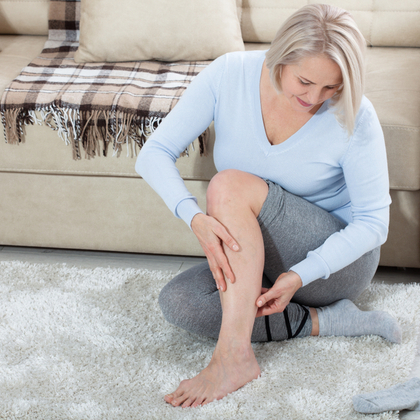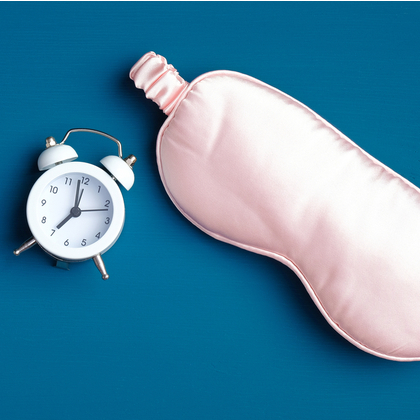
Magnesium plays a role in more than 300 biochemical reactions in the body (1). Beyond helping to maintain normal muscle and nerve function, this mineral supports normal psychological function and protects bones and teeth. Magnesium also contributes to energy metabolism, as well as supporting the reduction of tiredness and fatigue.
This impressive, multi-tasking mineral is often recommended for menopause due to its far-reaching health credentials. Here, we uncover how magnesium may support you throughout this hormonal transition, and how best to supplement it in your diet.
Why is magnesium important during menopause?
Sleep
Approximately 60% of menopausal women experience sleep disturbances (2). The perimenopausal highs and lows of progesterone and oestrogen amplify specific symptoms — hot flushes, sleep-disordered breathing, like sleep apnoea, and mood changes, such as anxiety and depression — contributing to sleep issues.
 Evidence suggests magnesium binds to the neurotransmitter gamma-aminobutyric (GABA), helping to settle any nerve activity that may otherwise fragment sleep (3). The mineral also activates the parasympathetic nervous system, which is responsible for promoting feelings of calm and relaxation (4).
Evidence suggests magnesium binds to the neurotransmitter gamma-aminobutyric (GABA), helping to settle any nerve activity that may otherwise fragment sleep (3). The mineral also activates the parasympathetic nervous system, which is responsible for promoting feelings of calm and relaxation (4).
Beyond easing the body into rest, magnesium has shown promise in improving sleep quality. Several studies have confirmed that this mineral encourages deep, restorative sleep (5).
Anxiety
As oestrogen and progesterone start to decline in perimenopause, this may disrupt the biochemical activity in your brain and affect the production of mood-regulating hormones, like serotonin. As a result, you may notice changes in your mental health, with emotions like panic, stress, and anxiety coming to the fore.
Besides this, contending with hot flushes, breast tenderness, fatigue, lower libido, mood swings, and insomnia may further compromise your emotional health and exacerbate anxiety.
Magnesium is believed to contribute to normal psychological function and, for that reason, is often recommended for anxiety. Research suggests this mineral helps to regulate the neurotransmitters in the brain (6). A recent meta-analysis of 18 studies revealed that magnesium intake directly correlates with decreased anxiety (7).
Fatigue
Fatigue is a relatively common symptom in the early stages of perimenopause as your body adjusts to its new chemistry and hormonal status. When oestrogen drops suddenly, you may experience waves of lethargy or ‘crashing fatigue’.
Other implications of low oestrogen, including insomnia, night sweats, and frequent urination, can also disrupt sleep and increase daytime fatigue.
Magnesium plays a central role in energy metabolism and supports the reduction of tiredness and fatigue. This mineral is involved in the production and stability of the ATP molecule, which supplies energy for many bodily processes.8 Alongside this, magnesium also helps to convert glucose into energy.
Bone health
Oestrogen helps to regulate bone production and turnover, making it indispensable for bone health. However, due to the sharp decline of oestrogen in perimenopause, the risk of osteoporosis increases as you reach menopause and postmenopause. Women may lose up to 20 per cent of their bone density in the 5 to 7 years after the menopause (9).
Magnesium is crucial for the absorption and utilisation of both calcium and vitamin D, which are critically important for bone health (10). Your bones are also dense storage reservoirs of magnesium, where in times of need, magnesium is transferred from the bones to the bloodstream (11). As such, an adequate intake of magnesium is essential to prevent the loss of bone density.
Heart palpitations
Oestrogen also plays an important cardioprotective role. Not only does this hormone support the function of the arteries and blood flow, but it also helps to prevent the build-up of fatty plaque in the arteries and control cholesterol levels (12).
Some scientists believe that the drop in oestrogen during perimenopause may increase the risk of heart-related issues (13). Indeed, magnesium is involved in the transportation of the electrolytes into cells, which helps to regulate heartbeat. Evidence suggests low levels of magnesium may contribute to irregular heartbeat and, in some cases, heart palpitations (14).
What type of magnesium is best for menopause?
To support your overall health in menopause and beyond, you should make a conscious effort to pack your diet with quality magnesium sources. These include:
-
Dark, leafy green vegetables - kale, spinach and watercress
-
Nuts and seeds
-
Legumes -kidney beans, black beans, and chickpeas
-
Whole grains – oats, brown rice, and quinoa
-
Seafood, like mackerel, tuna and salmon
-
Dark chocolate
-
Tofu
But while you can get enough magnesium from food, few people do. Most Western diets supply low amounts of magnesium. Fortunately, however, high-quality supplements can replace depleted magnesium stores.
When choosing a magnesium supplement, it is important to note that some forms are more bioavailable (readily absorbable) than others. For instance, Magnesium Citrate is significantly more bioavailable than other types. Poorer forms have a lower absorption rate and may loosen stools.
How much magnesium does a menopausal woman need?
For most menopausal women, we advise between 250 – 400mg of magnesium daily. MagAsorb Ultra 375mg is an excellent choice for its absorption and quality.
Magnesium is a powerful and versatile mineral that can support many areas of your physical and psychological health in menopause. Throughout this natural hormonal transition, you should try to eat plenty of magnesium-rich foods or take a quality supplement as an insurance policy.
Learn more about managing your health in menopause in our Menopause hub
References:
-
diet, M., 2020. Magnesium In Diet: Medlineplus Medical Encyclopedia. Available online: https://medlineplus.gov/ency/article/002423.htm
-
Sleep Foundation. 2020. Menopause & Sleep - Sleep Foundation. Available online: https://sleepfoundation.org/articles/menopause-and-sleep
-
Uygun D. et al., Bottom-Up versus Top-Down Induction of Sleep by Zolpidem Acting on Histaminergic and Neocortex Neurons. The Journal of Neuroscience. 2016;36(44):11171-11184.
-
Wienecke. E., Nolden C., Long-term HRV analysis shows stress reduction by magnesium intake. MMW Fortschr Med. 2016;158(Suppl6):12-16.
-
Abbasi B. et al., The effect of magnesium supplementation on primary insomnia in elderly: A double-blind placebo-controlled clinical trial. J Res Med Sci. 2019;17(12):1161-9.
Rondanelli M. et al., <span itemtype="http://schema.org/Organization" itemscope="" itemprop="nameThe Effect of Melatonin, Magnesium, and Zinc on Primary Insomnia in Long-Term Care Facility Residents in Italy: A Double-Blind, Placebo-Controlled Clinical Trial. Journal of the American Geriatrics Society. 2011;59(1):82-90
-
Kirkland AE. et al., The Role of Magnesium in Neurological Disorders. Nutrients. 2016;10(6):730.
-
The Effects of Magnesium Supplementation on Subjective Anxiety and Stress—A Systematic Review. Nutrients. 2017;9(5):429.
-
Jahnen-Dechent. W., Ketteler M., Magnesium basics. Clinical kidney journal. 2012;5(Suppl1):i3-i14.
-
nhs.uk. (2020). Menopause and your bone health. Available online: https://www.nhs.uk/live-well/healthy-body/menopause-and-your-bone-health/
-
Orchard TS. et al., Magnesium intake, bone mineral density, and fractures: results from the Women's Health Initiative Observational Study. The American journal of clinical nutrition. 2014;99(4):926-933.
-
Jahnen-Dechent. W., Ketteler M., Magnesium basics. Clinical kidney journal. 2012;5(Suppl1):i3-i14.
-
Bhf.org.uk. 2020. Menopause And Your Heart. Available online: https://www.bhf.org.uk/informationsupport/heart-matters-magazine/medical/women/menopause-and-your-heart
-
Maas. A.H., Franke H.R., Women's health in menopause with a focus on hypertension. Netherlands heart journal: monthly journal of the Netherlands Society of Cardiology and the Netherlands Heart Foundation. 2009;17(2):68-72.
-
Dyckner T. Serum magnesium in acute myocardial infarction. Relation to arrhythmias. Acta Med Scand. 1980;207(1-2):59-66.
You Might Also Like
Disclaimer: The information presented by Nature's Best is for informational purposes only. It is based on scientific studies (human, animal, or in vitro), clinical experience, or traditional usage as cited in each article. The results reported may not necessarily occur in all individuals. Self-treatment is not recommended for life-threatening conditions that require medical treatment under a doctor's care. For many of the conditions discussed, treatment with prescription or over the counter medication is also available. Consult your doctor, practitioner, and/or pharmacist for any health problem and before using any supplements or before making any changes in prescribed medications.

Olivia
Olivia Salter has always been an avid health nut. After graduating from the University of Bristol, she began working for a nutritional consultancy where she discovered her passion for all things wellness-related. There, she executed much of the company’s content marketing strategy and found her niche in health writing, publishing articles in Women’s Health, Mind Body Green, Thrive and Psychologies.
View More



